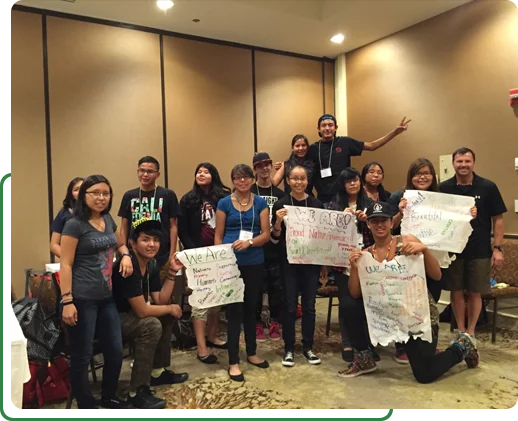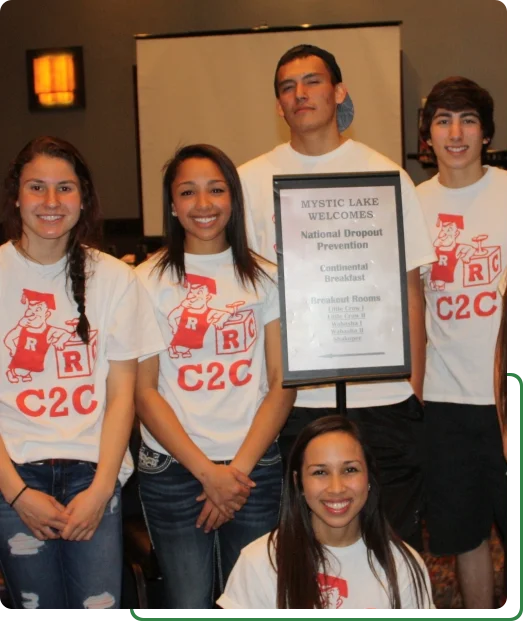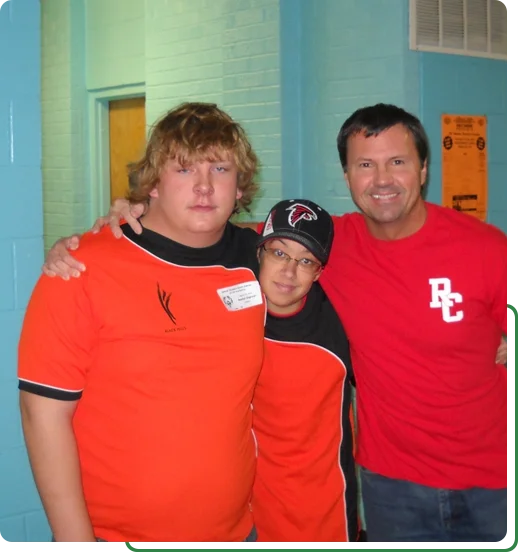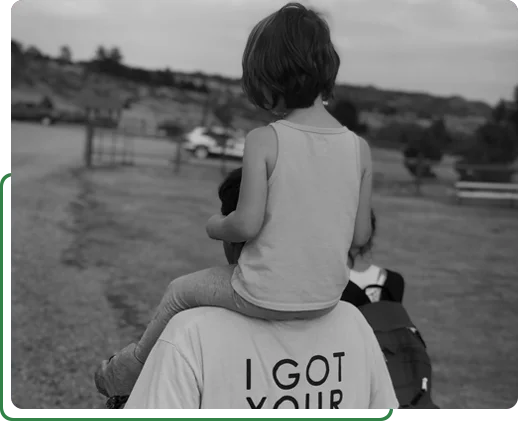

A training will be held monthly that focuses on the activities, training themes, and the social emotional learning themes for that month.
Each training will provide time to: learn the activities that include introducing and debriefing each activity, discussion topics and planning for the implementation of the themes.
Peer Leader trainings will focus on active based learning and experiential learning activities that directly relate Social Emotional Learning themes to student outcomes. Social Emotional Learning themes included are:


“Okay can I get X (request about 1/5 of the group) volunteers in the middle?”
“What we’re looking for from those of you in the middle is your name, your current position, how many years you have been in education, and if you were to invite us to your house/apt. for dinner, what meal would you serve? …that personifies/represents you/your family.
“Thanks. Okay- so this is a competitive chair game. If you’re sitting next to an empty chair, please turn it around. I’m going to make a statement and if that statement applies to you, I want you to run, not walk, to the opposite side of the room to find an open chair. Minimum requirement is to move at least 3 chairs”
“So if you’re on this side of the room you’re going to this side (point to opposite side) and thoseon this side are going to that side.”
“Remember, the chairs that are turned around are out of play.”
“If you’re in the middle, you can just find a chair anywhere.”
“Get ready… Move if you’ve ever…” [Remind participants that if they’ve already been in the middle they can pick someone. Keep an eye on how many participants have gone so that you’re not left with 1 or 2 participants to go.]
Last round: “Move if you’ve… and if you’ve never been in the middle please come in the middle. This is our last round.”
Other questions:
What advice would you give your 18-year-old self?
Why did you choose this profession?
Questions for students:
When is your birthday?
What is your favorite activity outside of school?
Debrief – What was the common things mentioned? Did you mention life lessons or specific academic lessons? Life is about learning many lessons and the life or social/emotional lessons are very important to our happiness.
This is a modification of the Chair Game. Participants stay in their chairs and give brief answers to a question.
Facilitator will ask the question and model a concise answer. Participants will provide answers in the order in which they are sitting.


Sample question: Name someone who has had a positive impact on you or someone who adds skills or strength to your life. “For me…(share example of adding complementary skill)…
Questions for students:
What is your favorite class?
What is your favorite food?
Name a place you would like to visit.
Describe a large diagram of a scale from 1 to 10 on the floor, and ask the group members to physically place themselves according to what number certain situations put them in. The number Ten is an area where the participants are very comfortable and the number One is the area where they are not. They can choose numbers (areas) between 1 and 10 if they feel those numbers are more accurate in their response.
As you ask questions there will be movement to and from each number. No one can give a wrong answer because each person’s placement reflects their own perceptions.
Questions:
Move to the number that represents your choice to:


As an alternative to the 1-10, this can also be done as a ‘Would you Rather’ Scenario. On one side are the “Yes” answers and at the other end of the space are the “No” answers. Or, the ends can be specific answers, such as, “would you rather have a burger or a pizza”? People who answer burger move to one end while the pizza answers move to the other.
Participants will move to space that represents their answer on opposite sides of the room.
What things do we have in common with others?
Even though you may not have known some of the other participants when we started, what did you learn about someone in the group?
Group will be standing in a circle. Someone in group will ask a question and if participants can answer “Yes” to the question, they will walk straight across the group to a new spot.
Variation – Similar to the Chair Game, have one person stand in the middle and ask the question. The question must be true the person in the middle. Once the questions is asked, the participants will scramble to find new places in the circle if the question was true to them. The last person to get to a spot in the circle will the person in the middle asking the next question.
Explain that you will be playing a Rock, Paper, Scissors tournament. Review the rules of the game. The tournament will start with everyone finding a partner and playing one round of Rock, Paper, Scissors.
It is a sudden death game, not two out of three. When someone wins the round, they will move on to play someone else who won. The other person will stand behind the person who won and chant their name and be their biggest fan.
Those who win will continue to find other competitors who have also won, while the those who lose will join the other person fan club. This continues until you have two people left who play for the tournament win.
Congratulations! You were recommended by peers and teachers as someone who has leadership and influence among your friends and peer group. We invite you to apply for one of the mentoring positions for the 2014-2015 school year. The simple fact is we need your involvement to be effective. When we get peer leaders like you, working with trusted adults, it can help students identify and build strengths and positive relationships. It is truly an honor to be nominated for this program.
The Peer Mentors provide encouragement, information, resource help, friendship and overall support. Experiencing time together, fun activities and forming a trusting bond with another high school student can have a powerful and positive impact on fellow students. You can be an important part of making a student’s year in high school successful!
Typical requirements to be a tutor/mentor: B’s or better if working with same aged peers, C’s or better if working with freshmen, a history of regular school attendance and appropriate school behavior and a teacher recommendation. A student who is friendly, responsible and regarded as a good role model is the ideal candidate.
In addition, trainings and orientation are required to be part of the program. All students will be enrolled in a Peer Helper class and will earn ½ of an elective credit.
If you are interested in becoming a mentor for the 2014-2015 school year, please pre-registerfor the Peer Leader class. If you have any questions or would like more information, please see me in the Counseling Center.
Thank you,
When tutoring, we must stay aware that we are tutors and cannot solve every problem. So in order to lead the most productive session possible, here are some things to keep in mind.



